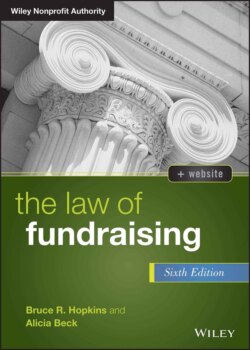Читать книгу The Law of Fundraising - Bruce R. Hopkins - Страница 39
§ 2.7 VIEWPOINT OF A REGULATED PROFESSIONAL
ОглавлениеMost fundraising professionals do not believe that their practices in assisting charities to acquire charitable gifts are in any way abusive to potential donors or other citizens. It is no surprise, then, that they find government regulation of philanthropy to be unduly restricting and a misdirection of resources. What follows is the view of one of these regulated professionals.59
The nonprofit organizations that collectively constitute the “third sector” of the U.S. economy are a loose and unorganized delivery system for services that are generally not profitable, are too cumbersome, or are too partisan for business or government to support. Our societal response is to fund these endeavors through private financial support of philanthropy. The impetus to modern philanthropy is the still rather vague and developing discipline of fundraising (also called development and/or financial resource development).
For the most part, the third sector is populated by well-intentioned, hardworking individuals whose dedication to a particular cause or goal takes precedence over personal gains and rewards. This description also includes the majority of fundraisers, particularly those whose careers are encompassed by employment solely as staff of nonprofit organizations.
The thinking of most practitioners is that the regulation of fundraising practices is similar to “preaching to the choir.” Although no precise sources of data are available concerning the verifiable amount of fraud or other abuse in fundraising, it can safely be said that the actual level is far lower than the general perception holds, and quite laudable when compared with other forms of activity in our society. By and large, the fundraising activities engaged in to benefit nonprofit organizations are conducted with an exceptionally high degree of honesty and professionalism.
Regardless of their intent or reason for being enacted, regulations are perceived by practitioners of fundraising as a breach of the public's trust in the operation of nonprofit organizations or, at the very least, regulations are a nuisance. The members of the third sector generally believe that well-run, well-intentioned nonprofit organizations do not abuse the public's trust. Existing accounting and audit procedures, along with other routine guards against fraud and the like, are seen as adequate to protect fundraising activities, by and large. To be regulated is to be insulted by the “public,” which the nonprofit organization and the fundraiser are working to assist. The real abuses are performed by “those other guys,” the unprofessionals who will do anything for a buck.
That perception of selfless service does not exempt fundraisers from scrutiny, nor should it; however, such a perception, coupled with the decentralized and diverse nature of the third sector, creates a perfect environment for miscommunication, misunderstanding, and distrust with regard to fundraising regulation.
Although the regulated and the regulators have the same goal—the protection of the public from fraud and deception—the reality is that practitioners are generally unsupportive of regulation, and regulators are generally unaware of the third sector's nature and operations (concerning resource development) and of the impact that regulation has on delivery of services. In general, there is considerable confusion and too little action based on consistent dialogue and the understanding built by mutual respect.
Both extremes of regulation—too much and too little—are regrettable; however, to engage in any level of regulation with so little dialogue between concerned and affected parties is like running in the dark. Rather than spend precious resources and valuable time highlighting specific shortcomings and failures of regulation from either perspective, those who perceive a need for regulation and those who are to be regulated should develop simple and consistent communication. This communication could take several forms, such as annual or biannual meetings of representatives from fundraising professional associations and legislators and/or enforcement entities; testimony or position papers delivered during the regulatory development process; meetings, conferences, and symposia sponsored by philanthropic foundations interested in the health and well-being of the third sector; and the like.
The specific means of communications are not important if they are effective in stimulating and maintaining the much-needed dialogue. The real value lies in their ability to produce outcomes that answer some rather simple questions, such as:
Are donors protected and is philanthropy nurtured?
Are funds used to support those purposes for which they are solicited?
Are the regulations fair to all nonprofit organizations?
Can the regulations be evaluated for effectiveness?
Often, regulations are a reaction to a perceived form and level of abuse. The perception may be correct or incorrect; that is not the issue. The issue is that the enacted regulation rarely benefits from the type of exchanges described previously. Less or more regulation is not important; better regulation is.60
